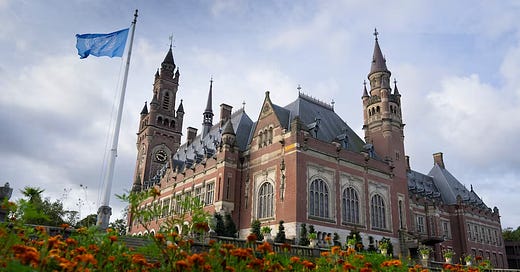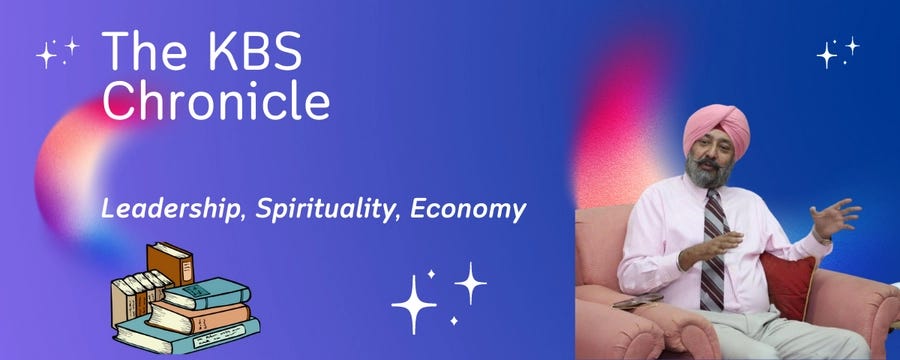South Africa vs. Israel: Genocide Allegations in the ICJ, The Hague
International Court of Justice, The Hague is a new theatre of action. 10-point summary in a 3-minute read.
International Court of Justice: Gaza “Genocide” Hearings Begin
While the UN Security Council grapples with the resolution (pun intended) of this protracted issue, and Qatar's diplomatic efforts seem to be yielding modest results, the end of the conflict in Gaza remains elusive. This case in the International Court of Justice (ICJ) is noteworthy not due to optimism for a definitive resolution or a binding verdict but because it underscores South Africa's proactive stance, contrasting markedly with the silence from Arab nations. South Africa, a nation that endured decades of the most pernicious apartheid policies rooted in blatant racial discrimination, symbolizes a country that has risen from the atrocities of colonial rule - a transformation epitomized by Nelson Mandela's triumphant struggle. The case also brings the effectiveness of the ICJ into spotlight, with many considering the institution as increasingly obsolete in the face of contemporary geopolitical challenges.
Legal Representation in the ICJ Case: South Africa vs Israel
In the significant International Court of Justice (ICJ) case involving South Africa and Israel, each country has appointed distinguished legal experts to lead their respective teams. South Africa's legal team is spearheaded by John Dugard, a renowned human rights specialist with deep experience in investigating alleged rights violations by Israel in Palestinian territories. Dugard's past roles include serving as an ad hoc judge at the ICJ. Israel's defense is led by Malcolm Shaw, a British lawyer with expertise in territorial disputes, having represented nations like the United Arab Emirates, Cameroon, and Serbia at the ICJ.
Both countries have also appointed ad hoc judges to the ICJ bench, a total of 17, reflecting a blend of legal and personal backgrounds. Israel selected Aharon Barak, its former high court president known for advocating judicial independence and critiquing Prime Minister Benjamin Netanyahu's court overhauls. Barak, a Holocaust survivor, has previously defended Israel's actions in Gaza as compliant with international law. South Africa appointed Dikgang Moseneke, a former deputy chief justice instrumental in drafting the nation's interim constitution during its transition from apartheid. Moseneke, an anti-apartheid activist who faced imprisonment for his beliefs, brings a contrasting yet equally compelling background. This blend of legal acumen and personal histories of the appointees adds a layer of complexity and intrigue to the case, potentially leading to an intriguing clash of perspectives in court.
10-Point Summary: Case against Israel at the ICJ
Israel's Defense at The Hague: Israel appeared at the International Court of Justice to respond to accusations of committing genocide in Gaza. This case could significantly influence the ongoing war's trajectory.
South Africa's Allegations: The nation accuses Israel of violating international law by engaging in and failing to prevent genocidal acts aimed at destroying Palestinians in Gaza.
Israel's Rejection of Claims: Both Israel and its key ally, the United States, have dismissed these allegations.
Impact on Israel's Military Campaign: The case increases international pressure on Israel to scale back or end its military operations against Hamas in Gaza.
Humanitarian Crisis in Gaza: The conflict has reportedly led to over 23,000 deaths, with a significant number of women and children affected, and pushed Gaza to the brink of famine.
Genesis of the Conflict: The escalation followed Hamas militants' attacks in Israeli territories on October 7, resulting in numerous casualties and hostage situations.
Role and Authority of the ICJ: The ICJ, a principal judicial organ of the UN, has the mandate to adjudicate disputes between nations. While its verdicts are legally binding, enforcement is challenging.
South Africa's Case: The country's filing emphasizes Israel's intention to destroy the Palestinian population in Gaza and cites various actions by Israel as evidence of genocidal intent.
Challenges in Proving Genocidal Intent: Demonstrating Israel's specific intent to destroy Palestinians as a group in Gaza is a critical aspect of South Africa's case.
Israel's Counterarguments: Israel strongly denies the genocide allegations, accusing Hamas of using civilians as human shields and asserting that their military actions are against Hamas, not civilians in Gaza.
Significance of the Hearings: The hearings address provisional measures to prevent further deterioration in Gaza while the case proceeds. The focus is on immediate actions like ensuring the delivery of aid and upholding international commitments.
A Sliver of Hope Amidst Prolonged Turmoil
The ongoing legal proceedings at the ICJ, despite their limitations and the complexity of enforcement, offer a glimmer of cautious optimism. They represent a critical step towards addressing the humanitarian crisis in Gaza and holding nations accountable for their actions under international law. However, given the intricate geopolitical dynamics and the challenges in enforcing ICJ rulings, the path to a peaceful resolution remains fraught with uncertainties.







Brief, concise and to the point- the hallmark of your writings, sir. A great read, as usual!